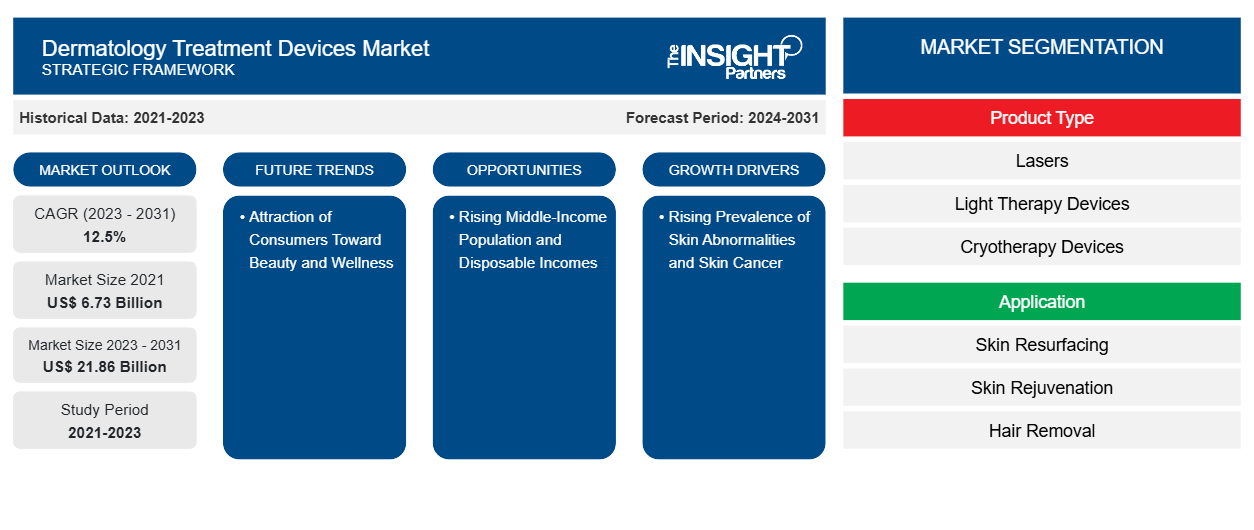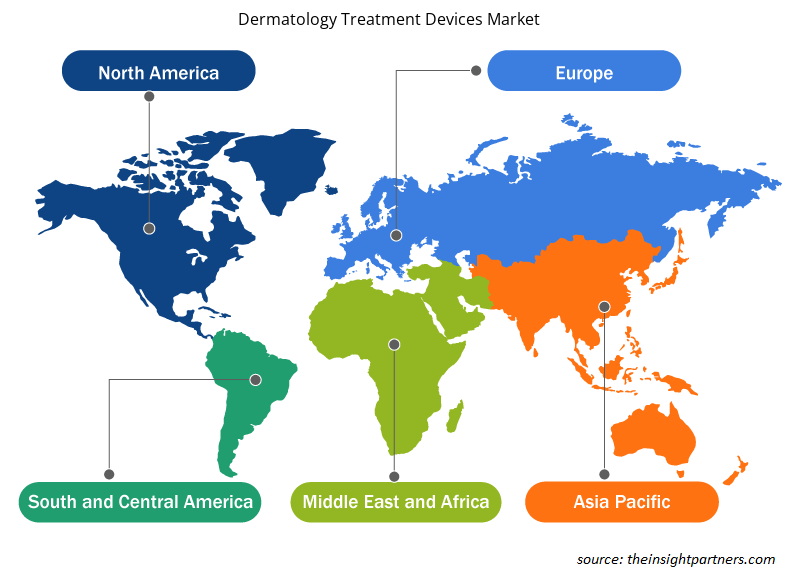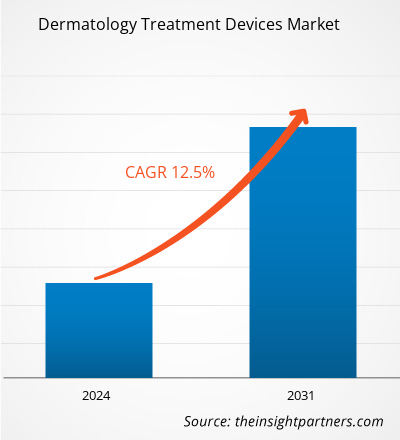The dermatology treatment devices market was estimated to be US$ 6.73 billion in 2021 and US$ xx billion in 2023. It is expected to reach US$ 21.86 billion by 2031 and record a CAGR of 12.5% until 2031. Home use dermatology devices, integration of AI in dermatology devices and development of dermatology devices with customised settings will likely remain key dermatology treatment devices market trends.
Dermatology Treatment Devices Market Analysis
Rising prevalence of skin diseases is expected to drive the dermatology treatment devices market's growth. Age-related skin issues such as pigmentation, wrinkles, creases, and acne, as well as burn scars caused during accidents are common among masses. According to the National Center for Complementary and Integrative Health, one in three Americans suffers from skin diseases. Further, as per the Skin Cancer Foundation, one in five Americans will develop skin cancer by the age 70 and over 2 people die of skin cancer in the U.S. every hour. These skin diseases require critical medical intervention and dermatology devices for their therapeutic treatment to combat severe condition, which is further likely to propel the growth of the dermatology treatment devices market.
Dermatology Treatment Devices Market Overview
Global dermatology treatment devices market is segmented by region into North America, Europe, Asia Pacific, Middle East & Africa and South & Central America. The market growth in this region is expected due to factors such as the rising prevalence of skin issues and technological advancements in dermatology treatment devices are expected to boost the growth of the market. However, the risk of undesirable side effects associated with the use of dermatology treatment devices is likely to hinder the market growth.
Customize This Report To Suit Your Requirement
You will get customization on any report - free of charge - including parts of this report, or country-level analysis, Excel Data pack, as well as avail great offers and discounts for start-ups & universities
Dermatology Treatment Devices Market: Strategic Insights

- Get Top Key Market Trends of this report.This FREE sample will include data analysis, ranging from market trends to estimates and forecasts.
You will get customization on any report - free of charge - including parts of this report, or country-level analysis, Excel Data pack, as well as avail great offers and discounts for start-ups & universities
Dermatology Treatment Devices Market: Strategic Insights

- Get Top Key Market Trends of this report.This FREE sample will include data analysis, ranging from market trends to estimates and forecasts.
Dermatology Treatment Devices Market Drivers and Opportunities
Technological Advancements in Dermatology Treatment Devices to Favor the Market.
Continuous research and development studies are being carried out worldwide to understand skin-related medical conditions better. Companies are investing in developing new and innovative medical devices to secure good return on investment (ROI). In addition, the approval by regulatory authorities confirms the reliability and credibility of the new-age products and medical devices for skin treatment. For instance, in February 2024, Nu Skin Enterprises, a global beauty and wellness leader, introduced Nu Skin RenuSpa iO, a microcurrent body device a smart beauty and wellness device designed to promote overall wellness and body through skin stimulation.
Rising Middle-Income Population and Disposable Incomes – An Opportunity in Dermatology Treatment Devices Market
As per the European Union, the global middle class is expected to reach 5.3 billion people by 2030, and the Asian population will likely be at the forefront of this development. By 2030, China and India are expected to represent ~66% of the global middle-class population and 59% of middle-class consumption. The expansion of the middle-class, with significant changes in consumer behavior and consumption patterns, is likely to drive economic development. In addition, the US Bureau of Labor Statistics stated that the disposable income in the US increased from US$ 10,036.9 billion in 2006 to US$ 21858.08 billion in 2021.
Dermatology Treatment Devices Market Report Segmentation Analysis
Key segments that contributed to the Dermatology Treatment Devices market analysis derivation are services and applications.
- Based on product type, the dermatology treatment devices market is segmented into lasers, light therapy devices, cryotherapy devices, microdermabrasion devices, energy-based therapies devices and microneedling. The laser segment held the largest share of the market in 2023, whereas the light therapy devices segment is anticipated to register the highest CAGR in the market during the forecast period.
- The market is segmented by application skin resurfacing, skin rejuvenation, hair removal, psoriasis, scar, warts and skin tags, hyperpigmentation and vascular lesions, acne, tattoo removal, and hyperhidrosis. The skin rejuvenation segment held the largest share of the market in 2023, whereas the hair removal segment is anticipated to register the highest CAGR in the market during the forecast period.
- By end-user, the dermatology treatment devices market has been segmented into hospitals, SPA clinics, dermatology clinics and surgical centers. The dermatology clinics held the largest share of the market in 2023, and the same segment is estimated to register the highest CAGR in the market during the forecast period.
Dermatology Treatment Devices Market Share Analysis by Geography
The geographic scope of the dermatology treatment devices market report is mainly divided into five regions: North America, Asia Pacific, Europe, Middle East & Africa, and South America/South & Central America.
North America includes US, Canada, and Mexico. The market in North America held a significant share in the global market during the year 2023. The demand for the market in the region is anticipated to witness growth at a significant rate during the forecast period owing to various factors such as increasing demand for advanced technology-based dermatology solutions, rising incidence of skin diseases, technological advancements in the field of dermatology supported by FDA approvals and the presence of well-known market players.
The Asia Pacific is the fastest-growing market for dermatology treatment devices globally owing to the large population of countries such as China and India, the increasing focus of market players, and the introduction of new products or therapies in the country. Moreover, the rising incidence of skin disorders, growing awareness of cosmetic procedures to improve aesthetic appeal, increase in healthcare expenditure, and availability of technological advancements in dermatology devices help to boost the growth of the dermatology treatment devices market in the region.
Dermatology Treatment Devices Market Regional Insights
The regional trends and factors influencing the Dermatology Treatment Devices Market throughout the forecast period have been thoroughly explained by the analysts at Insight Partners. This section also discusses Dermatology Treatment Devices Market segments and geography across North America, Europe, Asia Pacific, Middle East and Africa, and South and Central America.

- Get the Regional Specific Data for Dermatology Treatment Devices Market
Dermatology Treatment Devices Market Report Scope
| Report Attribute | Details |
|---|---|
| Market size in 2021 | US$ 6.73 Billion |
| Market Size by 2031 | US$ 21.86 Billion |
| Global CAGR (2023 - 2031) | 12.5% |
| Historical Data | 2021-2023 |
| Forecast period | 2024-2031 |
| Segments Covered |
By Product Type
|
| Regions and Countries Covered | North America
|
| Market leaders and key company profiles |
Dermatology Treatment Devices Market Players Density: Understanding Its Impact on Business Dynamics
The Dermatology Treatment Devices Market is growing rapidly, driven by increasing end-user demand due to factors such as evolving consumer preferences, technological advancements, and greater awareness of the product's benefits. As demand rises, businesses are expanding their offerings, innovating to meet consumer needs, and capitalizing on emerging trends, which further fuels market growth.
Market players density refers to the distribution of firms or companies operating within a particular market or industry. It indicates how many competitors (market players) are present in a given market space relative to its size or total market value.
Major Companies operating in the Dermatology Treatment Devices Market are:
- Cutera Inc.,
- Bausch Health Companies Inc.,
- Sciton, Inc.,
- Lumenis,
- Alma Lasers,
- Cynosure,
Disclaimer: The companies listed above are not ranked in any particular order.

- Get the Dermatology Treatment Devices Market top key players overview
Dermatology Treatment Devices Market News and Recent Developments
The dermatology treatment devices market is evaluated by gathering qualitative and quantitative data post primary and secondary research, which includes important corporate publications, association data, and databases. The following is a list of developments in the market for dermatology treatment devices and strategies:
- In October 2021, Lutronic, the global leader in energy-based systems for medical aesthetics, introduced Derma V, a ground-breaking dermatology workstation. Derma V is a dermatology laser that skin specialists need for their daily work - vascular, pigment and rejuvenation - into a single, powerful and user-friendly technology. Before the launch of Derma V, dermatologists had to juggle technologies, switching from one purpose-built laser to another to use the right tool for the right procedure, often reducing efficacy and safety for speed and useability, or vice-versa. (Source: Company Press Release)
- In February 2023, MTG Co., Ltd. launched the "ReFa DERMA HEAT," a facial device that enables simultaneous action of high-frequency vibration heat and cooling with its unique "DERMA HEAT" technology. (Source: Company Press Release)
Dermatology Treatment Devices Market Report Coverage and Deliverables
The “Dermatology Treatment Devices Market Size and Forecast (2022–2030)” report provides a detailed analysis of the market covering below areas:
- Market size and forecast at global, regional, and country levels for all the key market segments covered under the scope
- Market dynamics such as drivers, restraints, and key opportunities
- Key future trends
- Detailed PEST/Porter’s Five Forces and SWOT analysis
- Global and regional market analysis covering key market trends, major players, regulations, and recent market developments
- Industry landscape and competition analysis covering market concentration, heat map analysis, prominent players, and recent developments
- Detailed company profiles
- Historical Analysis (2 Years), Base Year, Forecast (7 Years) with CAGR
- PEST and SWOT Analysis
- Market Size Value / Volume - Global, Regional, Country
- Industry and Competitive Landscape
- Excel Dataset
Testimonials
I wish to appreciate your support and the professionalism you displayed in the course of attending to my request for information regarding to infectious disease IVD market in Nigeria. I appreciate your patience, your guidance, and the fact that you were willing to offer a discount, which eventually made it possible for us to close a deal. I look forward to engaging The Insight Partners in the future, all thanks to the impression you have created in me as a result of this first encounter.
DR CHIJIOKE ONYIA, MANAGING DIRECTOR, PineCrest Healthcare Ltd.The Insight Partners delivered insightful, well-structured market research with strong domain expertise. Their team was professional and responsive throughout. The user-friendly website made accessing industry reports seamless. We highly recommend them for reliable, high-quality research services
Yukihiko Adachi CEO, Deep Blue, LLC.Reason to Buy
- Informed Decision-Making
- Understanding Market Dynamics
- Competitive Analysis
- Customer Insights
- Market Forecasts
- Risk Mitigation
- Strategic Planning
- Investment Justification
- Identifying Emerging Markets
- Enhancing Marketing Strategies
- Boosting Operational Efficiency
- Tracking Industry Innovations
- Aligning with Regulatory Trends
Yes! We provide a free sample of the report, which includes Report Scope (Table of Contents), report structure, and selected insights to help you assess the value of the full report. Please click on the "Download Sample" button or contact us to receive your copy.
Absolutely — analyst assistance is part of the package. You can connect with our analyst post-purchase to clarify report insights, methodology or discuss how the findings apply to your business needs.
Once your order is successfully placed, you will receive a confirmation email along with your invoice.
• For published reports: You’ll receive access to the report within 4–6 working hours via a secured email sent to your email.
• For upcoming reports: Your order will be recorded as a pre-booking. Our team will share the estimated release date and keep you informed of any updates. As soon as the report is published, it will be delivered to your registered email.
We offer customization options to align the report with your specific objectives. Whether you need deeper insights into a particular region, industry segment, competitor analysis, or data cut, our research team can tailor the report accordingly. Please share your requirements with us, and we’ll be happy to provide a customized proposal or scope.
The report is available in either PDF format or as an Excel dataset, depending on the license you choose.
The PDF version provides the full analysis and visuals in a ready-to-read format. The Excel dataset includes all underlying data tables for easy manipulation and further analysis.
Please review the license options at checkout or contact us to confirm which formats are included with your purchase.
Our payment process is fully secure and PCI-DSS compliant.
We use trusted and encrypted payment gateways to ensure that all transactions are protected with industry-standard SSL encryption. Your payment details are never stored on our servers and are handled securely by certified third-party processors.
You can make your purchase with confidence, knowing your personal and financial information is safe with us.
Yes, we do offer special pricing for bulk purchases.
If you're interested in purchasing multiple reports, we’re happy to provide a customized bundle offer or volume-based discount tailored to your needs. Please contact our sales team with the list of reports you’re considering, and we’ll share a personalized quote.
Yes, absolutely.
Our team is available to help you make an informed decision. Whether you have questions about the report’s scope, methodology, customization options, or which license suits you best, we’re here to assist. Please reach out to us at sales@theinsightpartners.com, and one of our representatives will get in touch promptly.
Yes, a billing invoice will be automatically generated and sent to your registered email upon successful completion of your purchase.
If you need the invoice in a specific format or require additional details (such as company name, GST, or VAT information), feel free to contact us, and we’ll be happy to assist.
Yes, certainly.
If you encounter any difficulties accessing or receiving your report, our support team is ready to assist you. Simply reach out to us via email or live chat with your order information, and we’ll ensure the issue is resolved quickly so you can access your report without interruption.















- Cutera Inc.
- Bausch Health Companies Inc.
- Sciton, Inc.
- Lumenis
- Alma Lasers
- Cynosure
- Candela Corporation
- Biofrontera Ag
- Leica Microsystems
- DermLite






 Get Free Sample For
Get Free Sample For